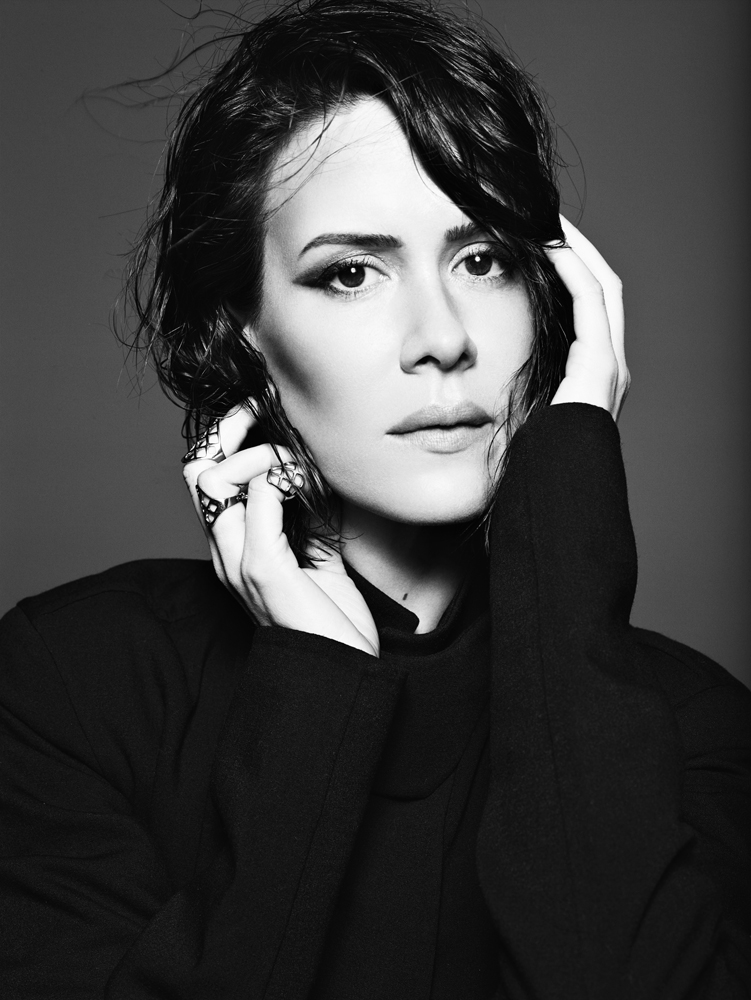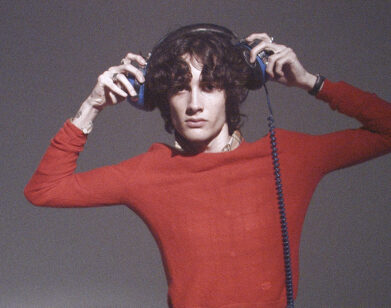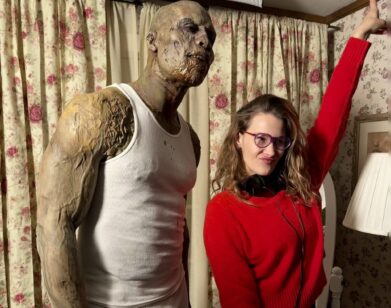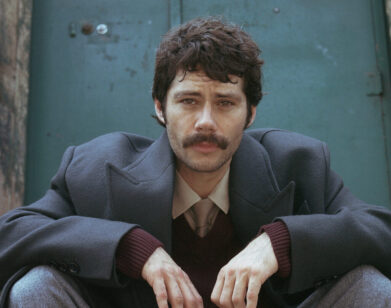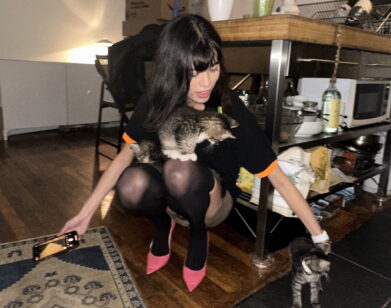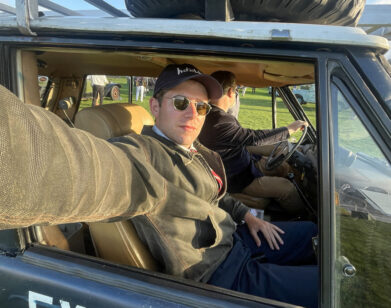Sarah Paulson
In the first three seasons of FX’s brilliantly batty American Horror Story, Sarah Paulson played a psychic, a witch, and a sociopathic journalist obsessed with an insane asylum—and received two Emmy nominations for her troubles. Ranging in pitch from camp to blood-curdling, her AHS characters, who are themselves often performing for others or seen refracted through another character’s point of view, have required Paulson to play stiff, broad, gay, straight, Stepford-y and spiritual, sinister and pure, shape-shifting, and verging on multiple-personalities. The only thing she could possibly do to top this run in range is to play two people at the same time—which, of course, she is doing in the show’s fourth season, “Freak Show,” premiering this month, as Bette and Dot Tattler, a pair of conjoined twins.
But, then, variety and transformation are not altogether new for the actress, 39, who was born in Tampa, Florida, and spent her adolescence in New York, where she attended Manhattan’s LaGuardia High School of Music & Art and Performing Arts. Paulson’s accomplished theater career began with a part as an understudy to Amy Ryan when she was only 18 and has included storied performances in Tennessee Williams’s The Glass Menagerie (alongside her AHS co-star Jessica Lange), Tracy Letts’s Killer Joe, and the Lanford Wilson play Talley’s Folly. Her television career pre-AHS ran the gamut from silly sitcom (the WB’s Jack & Jill) to Aaron Sorkin’s look behind the scenes of a sketch comedy show (Studio 60 on the Sunset Strip), from the serial (Law & Order, Grey’s Anatomy) to the prestige (Deadwood, Nip/Tuck)—and reached its apogee, perhaps, with her Emmy-nominated performance as Nicolle Wallace, advisor to the 2008 McCain-Palin campaign, in the HBO movie Game Change (2012).
Sprinkle in her recent slate of movies—Martha Marcy May Marlene (2011), Mud (2012), and 12 Years a Slave (2013), and the forthcoming Carol, directed by Todd Haynes—and Paulson’s body of work becomes impressively diverse. As she tells her friend and Game Change co-star Julianne Moore over the phone, variety is what she’s been after all along.
JULIANNE MOORE: Hey, sister. What are you doing?
SARAH PAULSON: I was buying a pair of jeans online. I got an e-mail saying there was a new pair out, and I was like, “I have to get them before my interview.”
MOORE: You better get them quickly. [laughs] Pants, you’ve got to grab them. So, before I knew you, we had to do the scenes in Game Change. I was so excited to work with you, and I didn’t know what you would be like. But when we started working together, I could feel your presence right away. I was like, “Wow.”
PAULSON: That means a lot to me coming from you. I was just trying not to pee my pants. But it’s funny, now I don’t think of you as one of the great actresses of our time. You’re just my friend Julie who’s the big goober, who likes to shop like I do.
MOORE: I like to shop online just as much as you do.
PAULSON: [both laugh] I remember thinking you were going to be super method-y. Did I ever tell you this? I thought, because your acting was so intricate and detailed and so completely immersed, that you were going to be kind of underwater—that you would come out and say hi every once in a while, and then go back in.
MOORE: [laughs] You’re very electric when you’re working. I know you went to the High School of Performing Arts, which I think is really kind of fascinating and exotic. How the heck did you end up there?
PAULSON: I was going to a private school in Brooklyn called the Berkeley Carroll School and I had an incredible acting teacher named Robert Stallworth, who, for whatever reason, just decided that I was an actress. It was, of course, what I wanted to do, but it was just sort of a dream. I didn’t think it was something that I could really do. I remember being on top of a jungle gym in the courtyard. He came up to me and said, “You know, you can apply to this high school where you can make acting your focus.”
MOORE: Hang on a second—how old were you when you were on top of the jungle gym?
PAULSON: How old are you in the eighth grade?
MOORE: You were still on a jungle gym in the eighth grade?
PAULSON: [both laugh] I liked to sit on top of it.
MOORE: Eighth grade, you’re like 14.
PAULSON: I wasn’t! I think I was 13. I remember starting school in the fifth grade, when I moved from Florida back to New York to be with my mom, and I was at P.S. 29—before Berkeley Carroll—and because I had been in Florida, I showed up at that school wearing, like, OshKosh B’gosh overalls. I had a terrible lisp and there were kids smoking in the bathroom. I was entirely underdeveloped.
MOORE: You’re like, “Where’s the teeter-totter?”
PAULSON: “Is there a see-saw somewhere?” [both laugh] I was sitting on top of the jungle gym, way too old for it, obviously, and he was like, “You can go to this school.” I thought that was the most exciting thing I’d ever heard. “But,” he said, “You do have to audition.” So I started working with him on different monologues. And this is how uneducated I was about it, and probably why I got in—because I was so brazen in a bizarre way—I played the mother in Bye Bye Birdie. When I think about it now, I can’t even believe that I was that brave. It was just pure naivety.
MOORE: Wow. And did you develop a broader understanding of what acting was at Performing Arts, or was it like a regular high school?
PAULSON: It was sort of like a regular high school, but there were a few teachers who were very dedicated to the idea that they were building a mini conservatory. We really did spend four hours a day in theater classes.
MOORE: So at that point, were you pretty determined that you were going to be an actor professionally?
PAULSON: Yes, and I actually got an agent when I was a sophomore, even though it was frowned upon. A substitute teacher named Alice Nagel came up to me one day and said, “I think you should be working.” We had been working on story-tale theater, and I was playing one of the evil stepsisters in Cinderella. She said, “I have an agent named Didi Rea …”
MOORE: I remember Didi Rea.
PAULSON: She didn’t know that we were discouraged from doing that. Performing Arts was not the same as Professional Children’s School down the street, which was really designed for kids who were working. We couldn’t fax our homework in.
MOORE: What’s fascinating to me is that somebody saw you like that. People sometimes ask me about seeing an actor’s ability, but the funny thing is I think you can tell whether a kid or a person can act. And in my experience, people can’t help announcing it. When you see it, you’re like, “Oh wait.” So then did you go to college or did you go straight to work?
PAULSON: All of my friends went to college and I got a job at Circle Pizza, where I worked for 24 hours. I had to call my mother four times to ask her how to spell Parmesan. I’m not kidding. I was a terrible speller. I think I was really nervous that I somehow didn’t feel right out in the world in that way.
MOORE: But you were also a kid. No one really knows what they’re doing then.
PAULSON: It was a disaster. I just never went back. I started auditioning, and the first job I ever got was understudying Amy Ryan in The Sisters Rosensweig on Broadway, directed by Daniel Sullivan. I was 18 years old. Toward the end of the run, Amy went to France, and I actually went on for two weeks. I remember feeling the temperature change the first time the curtain came up, the difference between the audience temperature and the stage temperature. I’ll never forget it. Have you ever understudied before?
MOORE: I have, but I never went on as an understudy. Going on is terrifying. So then you were off—you were a professional Broadway actress. Did you stay in New York City or did you go to L.A.?
PAULSON: I stayed in New York for a little bit. I did an episode of Law & Order, where I literally didn’t move my neck because I thought you couldn’t move your head on camera. [both laugh] I moved to L.A. and did a two-part episode of this British export show called Cracker. I kissed Josh Hartnett. I think Josh Hartnett’s first onscreen kiss was me, unfortunately.
MOORE: Aw. You have beautiful lips. I’m sure it was wonderful.
PAULSON: He was so sweet. And then I didn’t work for over a year.
MOORE: So what did you do?
PAULSON: I just waited. It was like a big cold glass of water thrown in my face. I’d gotten lucky right out of the gate, and then it kind of settled into something that would become more recognizable to me later, the ebb and flow. But it was scary. I had an apartment in Burbank. I had a roommate. I would go on auditions, but I just wasn’t getting anything. And then I got a phone call out of nowhere to do a Hallmark movie with Jack Lemmon. It was one of the last movies he did. He was so funny and so dear. He would keep chocolate in his pocket-dark chocolate for him and milk chocolate for me. It was my first time working with someone who I had admired so much, and he was so kind to me. One of the last things he said to me was, “Don’t ever forget how good you are, and don’t ever let anyone tell you different.”
MOORE: Sometimes the greatest actors are the greatest people. I think as a young actress starting out, it’s great when you have that connection. Like, “Oh, these people I’ve been watching on television, in movies, in theaters, they’re just human beings.” I think it allows you to make that leap to “I can do that stuff too.” You have so much variety in your work, and I know you have a particular affinity for theater—you talk about wanting to get back to it. Is it the medium that you prefer?
PAULSON: I like the time that you get. When I look at my career, the bulk of it has been television, and I love working in television, especially right now. But there’s a speed at which you do it. You’re doing seven to ten pages a day on a series, and it’s hard to feel like you’re doing the detail-oriented work that I like to do. Sometimes the speed helps you get out of your head and just go—you act on impulse and instinct, which can sometimes be better. You’re always working on something new, whereas if it’s a film or a piece of theater, you’re working on the same story. And I like the ritual. I’m addicted to routine. I don’t know if that’s because I moved around so much as child—by the time I was 12 years old, I had lived in about 10 different places. But I like going to the theater at a certain time. I like the ritual of putting on my makeup, putting on my costume, doing my warm-ups. I eat the same dinner every night before I go on stage. I like having something that I can count on, something that feels stabilizing for me.
MOORE: Do you ever get scared by the people watching?
PAULSON: In the beginning I do because of the judgment part. When I watch other actors, I have a lot of things that I respond to and some things I really don’t. And if I watch things that way, I imagine people are watching me that way. But I do like the immediacy of audience’s reaction. I like when I can hear the stillness and I know that they’re with us. I like that feeling in your brain when you’ve got seven things that you’re holding in one moment-you heard that person cough, you heard that person laugh, you’re also saying your line, you’re also listening to the person who’s talking to you.
MOORE: I’m afraid of the people watching in the theater. And the reason I sometimes prefer film, especially independent film, is that it’s easier for me to convince myself that I’m alone. [laughs]
PAULSON: I totally understand that. You got one guy who puts your pretzels on the table and then he’s also the boom operator. But didn’t you do a lot of theater in the beginning of your career?
MOORE: I did some. Not like what you did. I think your fearlessness in being able to have all those experiences is great. Is there a performance you’ve given for a play that was your most rewarding?
PAULSON: Well, I feel shy about answering this question because I know you saw it. So what if you’re like, “No. I don’t agree with you. That was not good.” [Moore laughs] But doing Sally Talley [in Talley’s Folly] was probably the most rewarding—
MOORE: Well, that was a spectacular performance. And you were beautiful. Do you remember, in The New York Times you were described as “slender as a stalk of wheat”?
PAULSON: Oh boy, do I remember it. That was actually the first time that I didn’t read the review right when it came out. I remember you telling me, “I read it. It’s great. And you’re slender as a …” [Moore laughs] I think it was just the cut of the dress, actually, because I’m all torso. I have the legs of a Scottie dog, and the waist of the dress came up right under the bust, so it made it look like I was longer and taller.
MOORE: Well, maybe we can switch because I could use a little more torso.
PAULSON: You give me your legs, and you can have my long torso? Yeah, let’s do it. Do you remember, around the time when Game Change came out, someone on Twitter switched our heads and put my head on your body and your head on my body?
MOORE: That’s fantastic.
PAULSON: Have you not seen that picture? It’s very funny. I think someone tweeted at me, and then I think I retweeted it or tweeted it at you—tweeted it, twatted it, whatever one does.
MOORE: Now, American Horror Story—God, there’s a lot to talk about. Is it three seasons you’ve been doing this?
PAULSON: We’re shooting season four right now. I’ve done all three. The first year I did only a handful of episodes and I’ve been in every episode since then. I had never really had the ball thrown at me quite in that way. I mean, nobody else had given me a shot at holding the series in the way Ryan [Murphy, co-creator of AHS] had me do the second season. For whatever reason, he saw something in me. I had done an episode of Nip/Tuck with him years before and I did a pilot for him that didn’t go—I was doing Studio 60 at the time. So I don’t quite know why he decided to hand the series to me the way he did. But I will be forever grateful to him for it because it was just incredible. Every time we do it, I get to play a completely different person. Where else in the world would I have been able to play all the different women I’ve played on this show? It’s been the greatest job that’s ever come my way thus far. That is for sure.
MOORE: I say this to young actors all the time, and I’m going to say this to you because you’re younger than me: Remember that nobody’s doing you any favors. When somebody casts you, they want you to solve their problem. They want you to be good, so know that they’re on your side. Know that about Ryan, too. When a producer or director grabs an actor like that, they think, “Oh thank God. Finally!” But what’s it like to play a lady with two heads?
PAULSON: It’s one of the more complicated things I’ve ever done, which is just how I like it. The more challenging it is, the more alive I feel. I’m playing a person who has two heads—so two separate brains, two separate sets of motor skills. So I’m having to do things with my body that are the polar opposite of what my body actually wants to do. It’s hard and scary because I don’t know if it’s going to work. We’re still so early into it; we’re only on the third episode. At the same time, it’s letting me know about other things that I didn’t know I was capable of. I’m acting by myself a lot, and one of my favorite things about acting is the connection that you make with another person. There’s something very, very valuable and exciting and moving to me about that part of what we do.
MOORE: Me too. That’s why I like it so much. And the reason I can say I completely understand is that I had to play look-alikes on a soap opera [As the World Turns] years ago, and I kept saying, “It’s really hard and it’s lonely, and it’s kind of boring,” because I was playing both parts and I always knew what was going to happen. I like the mystery. I like the excitement you get at touching another human being when you’re acting with them and then having a little spark and not knowing what is going to happen in between you.
PAULSON: Were your two characters very different people?
MOORE: One was the heroine type, the other one was her selfish, mean, British half-sister and cousin who had brown hair and glasses. And listen to this: the bad one slept with the good one’s fiancé, and the fiancé said that it was dark and he couldn’t tell the difference. [both laugh]
PAULSON: Oh my God. Well, we haven’t gotten into any of those scenes yet. But they’re attached, so, dark or not, you would know that there’s another head there, one would hope.
MOORE: You also work with the same group of people on AHS. It’s like a company.
PAULSON: I love it, to have the same crew. I’m not married. I don’t have children. My 17-year-old dog died. I’m kind of on my own. So I really like having the same camera guy for four years. I love looking around and seeing the hair and makeup people who have been there from the beginning. I like that sense of family in my workplace, having the same pair of eyes to look into.
MOORE: Is there something you would like to do in the future?
PAULSON: I’ve always wanted to go where the work was or where I was wanted. The idea that it can be planned is one I let go of a long time ago.
MOORE: I hear you. The only control we have, I think, is to say no.
PAULSON: Exactly. I’m at the mercy of others because I’m not a director. I’m not a producer. I’m not a writer. People talk about generating my own work, but I don’t really know how to go about that. There are certainly some roles in the theater I’d like to play but I don’t know if I’ll ever get to do it. I want to play Elizabeth Proctor in The Crucible, desperately.
MOORE: Oh my gosh, that could be done easily!
PAULSON: I always wanted to play Abigail, but those days are over.
MOORE: That ship has sailed.
PAULSON: It really sailed. It left the harbor. It’s way out at sea. I also want to play Nora in A Doll’s House. I just love what I do so much and I don’t want it to go away. I think it’s hard not to fear that. I hope that I’ve done enough, that there’s been enough variation in the things that I’ve done. Other than that, I don’t have a plan or a goal.
MOORE: What’re you going to wear to the Emmys? Congratulations on the nomination!
PAULSON: Um, girl, I don’t know. I spend too many late nights on dragging pictures to my desktop and e-mailing them to my stylist. I go to L.A. on Friday and I’m going to try them all on. But my hair’s brown—I know you like it blond. Remember, in your house, we were discussing my hair for season three, and you were like, “Make it blond, the blonder the better.” That was the Julianne Moore directive, and we took it. [both laugh] It should be credited, “Hair look by Julianne Moore.”
JULIANNE MOORE IS AN OSCAR-NOMINATED ACTRESS. THIS FALL AND WINTER, SHE WILL STAR IN THE HUNGER GAMES: MOCKINGJAY PART 1 AND PART 2, AND SEVENTH SON.

